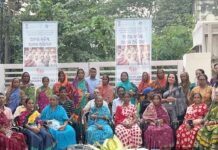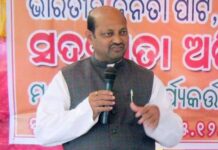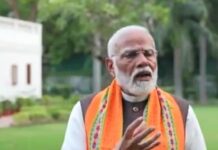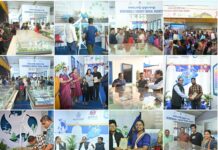By Our Correspondent
NEW DELHI/BHUBANESWAR: “More and more women should come forward to join the police force to empower themselves and empower women, and other vulnerable sections of the society. Police jobs are very much suitable for women who are physically and mentally strong, and who know what to do as part of their jobs, and commit to lifelong learning,” said Ms. Manjari Jaruhar, one of the first five women Indian Police Service (IPS) officers in India and the first from the state of Bihar.
Addressing girl children of SOS Children’s Villages of India, from across the country, in a session streamed live online,organised, on International Women’s Day, Jaruhar, who retired as Special Director-General of the Central Industrial Security Force (CISF), said that even today, there are only few women IPS officers, DSPs, and constables in the country, as there are misconceptions about the profession.But this profession is like any other profession where success depends on hard work, integrity, mental strength, and commitment to learning. “If you have aspirations to be a police officer, start from today. Do physical exercises regularly, and prepare for exams that qualify you for the police job of your dreams,” she urged.
Sharing the experiences of her own journey as a police officer, Jaruhar, said that when she wanted to become an IPS officer, her parents did not readily agree. They wanted her to consider a career in teaching or medicine. However, just then Kiran Bedi was making news as the first woman to join the IPS in 1972. Her success persuaded Jaruhar’s parents to relent. MsJaruharwas selected for the IPSin 1976 and held positions in the State Governments of Bihar and Jharkhand, the National Police Academy, CISF, and the Central Reserve Police Force.
Further, speaking on the occasion, Sumanta Kar, Secretary General, SOS Children’s Villages of India, said that “Investment in women’s health and education is key to bring about social changes and economic progress befitting India’s potential in every field. SOSCVI is committed to inspiring girls and women to aspire more. It is also striving to provide a conducive environment for them to realise their dreams.”
She is the recipient of the Government of India’s Police Medal for Meritorious Service and the President’s Police Medal for Distinguished Service. She was awarded the Director General’s Commendation Disc for outstanding service twice in the CISF and once when she was with the CRPF. “I am not saying that my job was easy. I had to struggle, and work hard. Though I always got all the support and cooperation from my subordinates, usually my superiors had second thoughts about my ability to handle complex and challenging assignments on the ground, considering my gender. But my enthusiasm for the job saw to it that I did justice to my job,” she observed.
MsJaruhar explained to the students the requirements and ways to get police jobs across the hierarchy – from the job of constable, sub-inspector, Deputy Superintendent of Police, and IPS.
Talking about the security and safety of women, MsJaruhar, advised women first to seek the help of police through helplines whenever they sense anything unusual in the public places, instead of trying to solve issues on their own. Whenever women travel, they should inform at least one person in the family or friend circle where they are headed and when they would return. They should leave their mobile number. They should avoid traveling in the night. They should travel light, with at least one hand free of luggage so that they could respond with it when a situation arises.
Jaruhar said that it is important that they dress appropriately for the sake of safety when they are in the crowd. They should go in groups, if they don’t know the surroundings well. They should not get involved with narcotics, and alcohol in social events. On social media, she said that girls and women should avoid sharing personal information online and meeting social media friends alone at less crowded places. “Safety begins with you. You must cooperate with your parents and guardians in issues related to safety,” she emphasized.The virtual session was attended by thousands of girl students and hundreds of women staff of SOS Children’s Villages of India, from across the country.
For the last 56 years, SOS Children’s Villages of India has been protecting the best interests of children who are without parental care or at the risk of losing one. It provides them a loving home, help keep their families together, and supports the youth on their path to self-reliance. Since the inauguration of the first SOS Children’s Village at Faridabad by in 1964, the organisation has spread across the country. Today, over 7,000 children live in 440 family homes inside 32 SOS Villages in 22 states/UTs, from Srinagar to Kochi and Bhuj to Shillong. They are lovingly cared for and nurtured by 600 SOS Mothers and Aunts.
As India’s largest self-implementing childcare NGO, SOS Children’s Villages directly touches the lives of around 25,000 children every year. Additionally it indirectly benefits another thousands of vulnerable children every year through a range of innovative and comprehensive childcare solutions to ensure that no child of any age grows up alone. The interventions range from short term (of a few months) to long term after-care programmes (till the children are 23 years old and self-reliant). These are carefully customised for each child to perfectly suit his or her needs.
SOS Children’s Villages’ “Family Like Care” programme is a curative model that provides loving homes in one of its Children’s Villages to children without parental care. Its “Family Strengthening Programme” is a preventive model that intervenes in vulnerable families (widows, single mothers, below poverty line, etc.) living in vicinity of Children’s Villages for preventing ‘at risk’ children from losing parental care. This is done by upholding their family income through women empowerment, awareness generation and capacity building.
SOS Children’s Villages of India has always moved deftly to answer the call of the children in need in many natural and man-made disasters. It also advocates for influencing stakeholders as well as inform public opinion on policies and legislation concerning the rights of millions of children and young people, who are deprived of quality care.



























